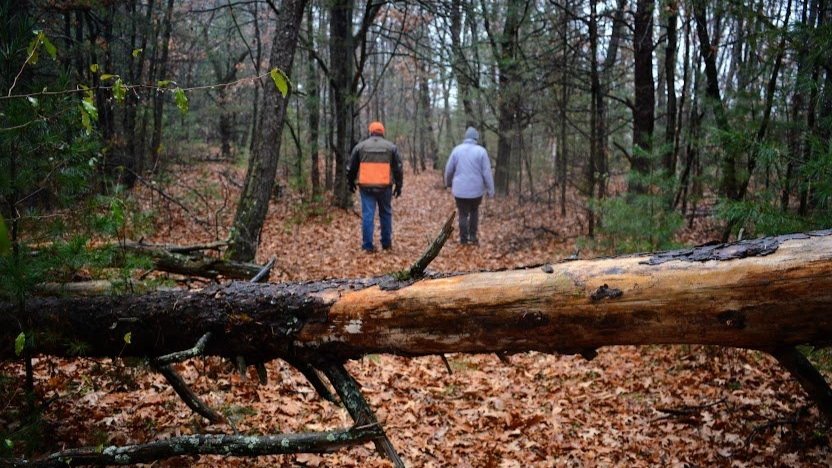Hull Island Protected Forever in Oscoda
An aerial view of the 42-acre Hull Island property on the Au Sable River, with Oscoda in the background.
A 42-acre forested tract along the Au Sable River near downtown Oscoda is under permanent protection following its acquisition Dec 5 by Huron Pines.
Known as the Hull Island property, the dynamic parcel is home to mixed hardwood and pine forests, sudden elevation changes and 3,300 feet of river frontage. Along with having high conservation value for wildlife habitat and water quality protection, the historic site holds great potential for recreation and Huron Pines plans to transfer the property to Charter Township of Oscoda as a public nature preserve.
This venture comes less than a year after Huron Pines completed a similar acquisition of Lake Huron Coastal Preserve—a 145-acre tract and 4,000 feet of coastline—and its transfer in January to nearby Alabaster Township.
The urgency to preserve and ensure public access to undeveloped lands has increased as the demand for waterfront real estate continues to grow across the region. Oscoda Township officials reached out to Huron Pines earlier this year for assistance in acquiring and protecting the Hull Island property along the east bank of the Au Sable River.
“The permanent protection of Hull Island is a direct result of our vision for conservation driven by engaged and empowered communities,” said Heather Huffstutler, Development Director for Huron Pines. “Community leaders who understand the value of protected places and are motivated to achieve this goal are vital to our success as an organization. This latest acquisition gives us the momentum we need to secure a healthy future for land and water across more of Northern Michigan.”
Two people hike a trail though a mixed hardwood forest on Hull Island in November.
The acquisition of the Hull Island property is supported by Huron Pines’ Community-Driven Conservation Campaign and donors to its Land Protection Program. The ongoing campaign aims to raise $1 million in unrestricted funds to finance grassroots conservation efforts in Northern Michigan with an emphasis on projects which benefit Lake Huron. More information about the campaign and ways to donate can be found by clicking below.
Huron Pines closed on the property Dec 5 for a purchase price of $325,000. Oscoda Township has applied for a Michigan Natural Resources Trust Fund (MNRTF) grant which, if awarded, will be used to help reimburse Huron Pines for the acquisition. Grant awards will be announced during the next meeting of the MNRTF Board happening Dec 13 in Lansing.
There are no plans to develop public access infrastructure before the transfer to Oscoda Township which is expected to occur sometime in 2024. Guided public tours and events will be advertised at huronpines.org/events.
An earthstar puffball rests on sandy soil. These unique fungi are prolific on parts of Hull Island.
Julia Butch is Land Protection Coordinator for Huron Pines and has been working with township officials on the acquisition and transfer. She said the diverse landscape combined with its closeness to Oscoda makes the Hull Island property an ideal place for a public nature preserve.
“The variety of landscapes in a relatively small area paired with elevated views of the Au Sable River really enhance the visitor experience, and it’s all right in the heart of Oscoda,” Butch said. “This has been a great opportunity to work with a community who shares our priorities in conservation and we’re opening new possibilities with Oscoda Township.”
Land Protection Coordinator Julia Butch smiles in the rain at a raised portion of Hull Island overlooking the Au Sable River in November 2023.
Along with its recreational and ecological value, Hull Island has historical ties to Oscoda’s peak lumber era of around 1870 to 1895.
Fred Glass is president of AuSable-Oscoda Historical Society & Museum. He said the island was named after the Hull Ely Mill which stood at the current site of Admiral gas station and the bridge to the island. Finished lumber was stacked on Hull Island before being shipped to places like New York and Chicago, which was rebuilding after the Great Fire of 1871.
Glass said lumbermen used dynamite to excavate and straighten the Au Sable River channel for floating timber to the mill, creating the oxbow wetland which still rings Hull Island today. Oscoda suffered its own fire in 1911, destroying the former mill and much of the town’s historical records.
Our deepest thanks go to all who have supported our Land Protection Program and our Community-Driven Conservation Campaign, making this acquisition & permanent protection of Hull Island possible. If you’d like to support grassroots conservation efforts across Northern Michigan, click here to learn more.




